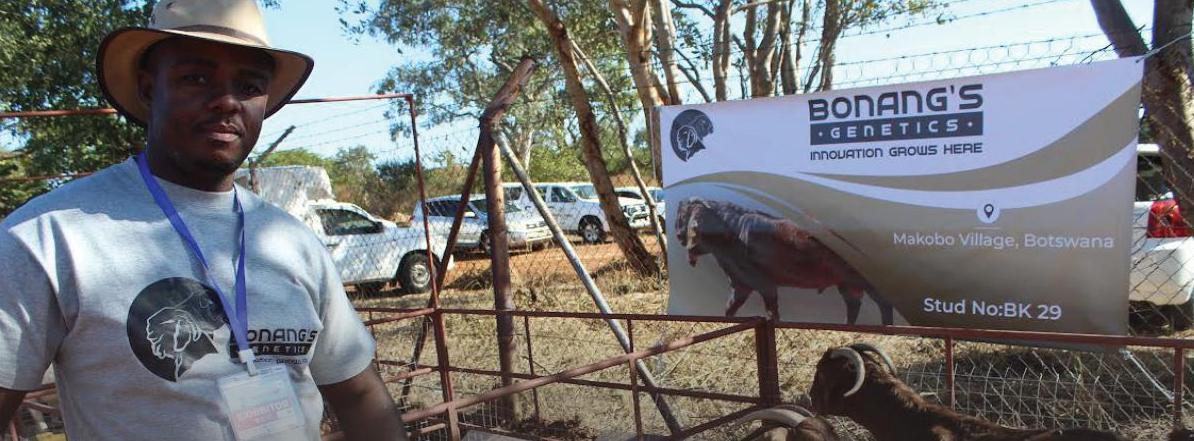Africa-Press – Botswana. As a boy growing up between Serowe and Tutume, Bonang Mafa hated farming. In his young mind, farming was all work and no fun, with scant financial rewards for all the hours of toil in the baking sun. Or so he thought!
Today, the 38-year-old has a very different view on life in the fields; the founder of a thriving small stock farm, Bonang’s Genetics, he eats and breathes farming.
“As a young boy I always felt farming was a waste of time. I wondered why we had to go to school barefoot while the family kept livestock. A cow then was only slaughtered when there was a bereavement or wedding,” he explained.
Mafa’s attitude towards farming shifted full scale in 2010 when he relocated to Gantsi as an adult. “It was here that I saw the real value of farming,” he said. “Farmers here had nice houses, were driving nice cars, and did not walk barefoot. It was then that I realised farming was never the problem, but it was an issue of management.”
It didn’t take him long to make up his mind; before the year ended, Mafa was rearing Boer Goats in Gantsi, later introducing Kalahari Red and Blackhead Doper to his flock. “15 years later, I’m still at it and have successfully established myself in the north, in Makobo village,” he told, adding the pull of the Pula which first attracted him to farming has long since been replaced by passion.
Setting up in Makobo was not easy, as Mafa had no access to water. He started by bowsing water for his animals, until he raised enough money to drill his own borehole. “Luckily goats, unlike cows, can survive on 5,000 litres of water for months.”
For the second year running, his business turned heads at the Business Botswana Northern Trade Fair (BBNTF) in Francistown. Scooping position one in the small stock category, just like they did in 2024, Bonang’s Genetics is a trusted stud service provider with a growing reputation.
“I sell off-springs to other farmers who want to breed; since I started in 2010, business has been doing quite well,” reflects the mild-mannered farmer, his declaration something of an understatement!
Bonang’s Genetics is thriving, with Mafa even starting to nurture other farmers in a business he believes has a market too big to be satisfied by one farmer.
“I operate in a 4.2 hectare farm, and this makes it very difficult for me to increase the number of goats and sheep I have. I’ve to be careful that there’s no overgrazing,” he said, listing stock theft, which he reveals is rampant in the area, as another big challenge. “Thieves can close down your kraal if you’re not careful. It’s something we’ve to deal with, as is the ever-present threat of Foot and Mouth,” he noted.
Despite his battles with land, disease and sticky-fingered bandits, Mafa has still found time to inspire other farmers, helping to improve their breed with his award-winning studs. Two of his clients exhibited at the BBNTF, a development that brings a smile to Mafa’s weather-beaten face.
The determined farmer says he hopes to see more people moving into this kind of farming, as he is confident the cake is big enough for all of them. “I want more small stock farmers to improve their animals’ genes. We’re here to provide that, and I want to see more of them taking part in next year’s trade fair,” he said.
Mafa hailed the BBNTF for changing his life, and making his farm what it is today. He said through the exposure from exhibiting last year, he was able to double his clientele, and now has contacts in Tuli Block and the southern region of the country.
“I take the trade fair seriously, because I know its value. When you’re keeping goats with so much value, this is the right place to find potential clients. The Kalahari Red for instance is very pricey, and is still very rare in South Africa which makes it even more valuable,” said Mafa.
With a Kalahari Red ram valued at over P50,000 and a young female Boer Goat fetching P35,000, Mafa’s total u-turn about farming is understandable. He has found gold in the cloven hoofed mammals, and in his words ‘more is still to come’.
“I want land. I’m still looking for more land, but it has not been easy,” he concludes; then again, the best things in life rarely are!
For More News And Analysis About Botswana Follow Africa-Press






